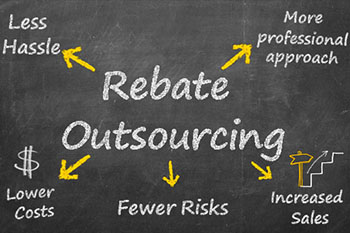In today's rapidly evolving business landscape, harnessing cutting-edge technology is essential for maintaining competitiveness. However, not all solutions are created equal, especially when it comes to identifying rebates. While artificial intelligence (AI), such as ChatGPT, has made impressive strides, businesses must be aware of potential risks before entrusting it with the vital task of rebate identification.

Old Data Can Cause Problems
When it comes to finding rebates, being accurate and up-to-date is paramount. ChatGPT and similar AI systems may fall short in providing up-to-the-minute information. The freely available ChatGPT by OpenAI is limited to a dataset dated September 2021. The paid version of ChatGPT and tools that incorporate it, such as Bing's Chat tool, have access to more recent data, but without explicit commands and plugins, you can't be sure about the timeliness of the data.
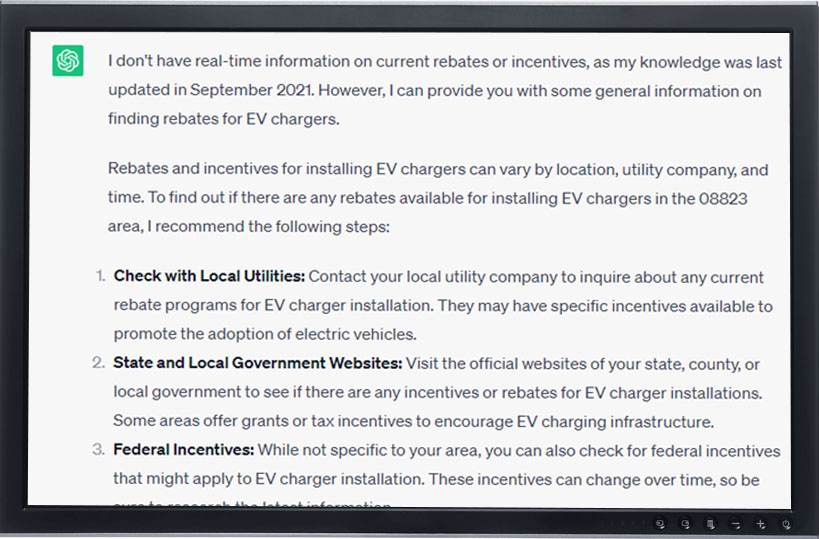
Rebates for energy efficiency equipment and EVSE are incredibly fluid. Programs run out of funding, rebate amounts change and new programs are introduced constantly; we've tracked over 300 significant changes so far this year. This means data from 2021 is virtually useless for new projects.
Imagine a scenario where a seemingly enticing rebate has already expired, but your AI tool presents it as an active opportunity. You then present it to a potential customer only to find out you were wrong. Such situations could lead to lost customers, misguided decisions, and ultimately financial setbacks.
The Risk of False Facts and Hallucinations
ChatGPT is a Large Language Model (LLM), which means it's designed to process requests formatted as general conversation and provide human-sounding responses. While ChatGPT demonstrates remarkable text generation capabilities, it's not immune to producing inaccurate or misleading information. As more people have used ChatGPT and similar tools, it has become evident that trusting its answers can be dangerous.
Responses from ChatGPT can sound incredibly convincing even when the information is incorrect or a complete fabrication, leading many to refer to them as "hallucinations." These hallucinations are the most dangerous aspect of relying on an AI system because the answer received from ChatGPT is stated very convincingly as a fact when, in reality, it's wrong.
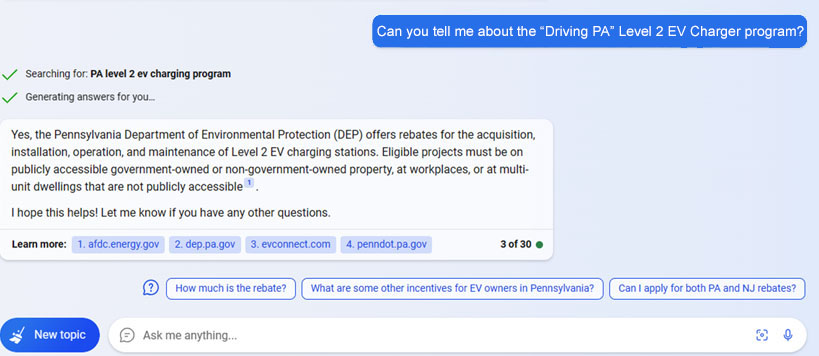
Minor inaccuracies can lead to major miscalculations, especially in rapidly changing industries like EV charging and EVSE rebates. Picture this: your AI tool presents a potentially sizeable rebate from a utility, yet the terms and conditions it provides are incorrect. This error could lead to botched negotiations and damage to business relationships.
Cumbersome and Time-Consuming User Experience
Estimating and applying for rebates is an incredibly time-consuming process already. Relying on AI, such as ChatGPT, for rebate identification could introduce unnecessary complexity and frustration. For example, AI might struggle to grasp the specific nuances and contextual details of your business. AI is strongest when it can processes vast amounts of data to come to conclusions. Rebates and incentives for specific technologies is such a small niche, there’s not much for the system to learn from. Therefore, the results you see are probably not suitable for your specific business.
In addition, ChatGPT results are only as good as the prompts they receive. Even though the tools understand speaking language, users must ask the right questions. For example, a user might ask about "EV charging rebates in Nebraska" but doesn't specify if it's for commercial or residential use or if it's a level 2 or level 3 charger. These issues can force users to engage in lengthy back-and-forths to clarify or navigate misunderstandings which could divert valuable time from essential business activities.
An alternative to ChatGPT for rebate identification
Even though AI may not be the ideal solution to helping identify rebates for lighting and EV chargers, new technology can still improve the process immensely. You don't have to rely on exhausting Google searches or cumbersome Excel spreadsheets. Tools like RebatePro and Rebate Finder allow you to look up virtually any rebate, incentive, grant, or tax credit available for the covered technologies in an efficient and effective manner.
Algorithms instead of AI
A key distinction in these tools is that they have been designed using advanced algorithms versus an AI/LLM model. AI is trained on massive amounts of data which it interprets, looks for patterns and makes its own decisions on how to process the data. Algorithms, on the other hand, are rule-based sets of instructions that process a fixed set of inputs and to provide standardized responses. Our algorithms have been trained and perfected over the last 15 years based on our experience filing thousands of rebate applications a year.
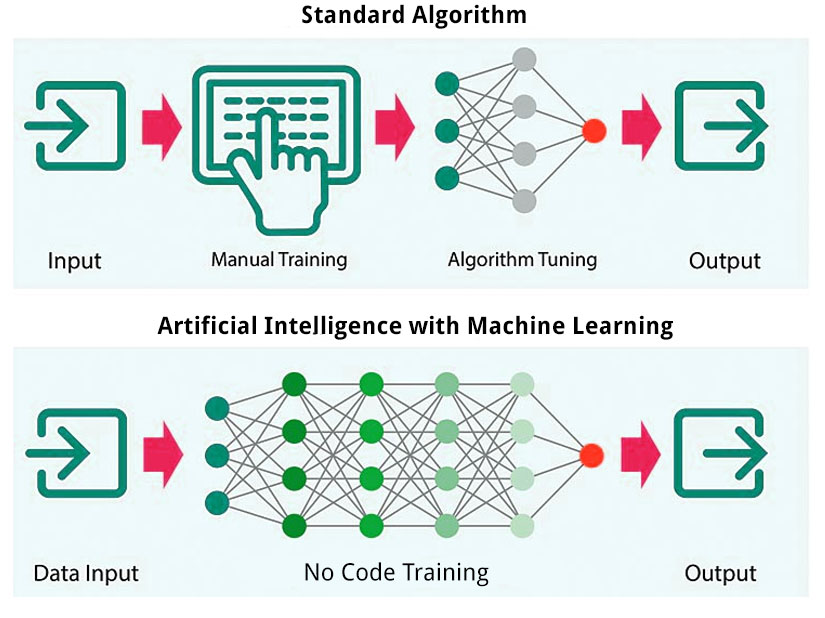
Fine-tuned user interface
Similarly, the interfaces have been perfected over the years for the explicit tasks of finding and estimating rebates. RebatePro has in-depth information like when programs have run out of funding in the past, which products may be eligible for a rebate, rules about specific facility types and technologies, etc. It gives an industry professional everything they need to know on one screen.
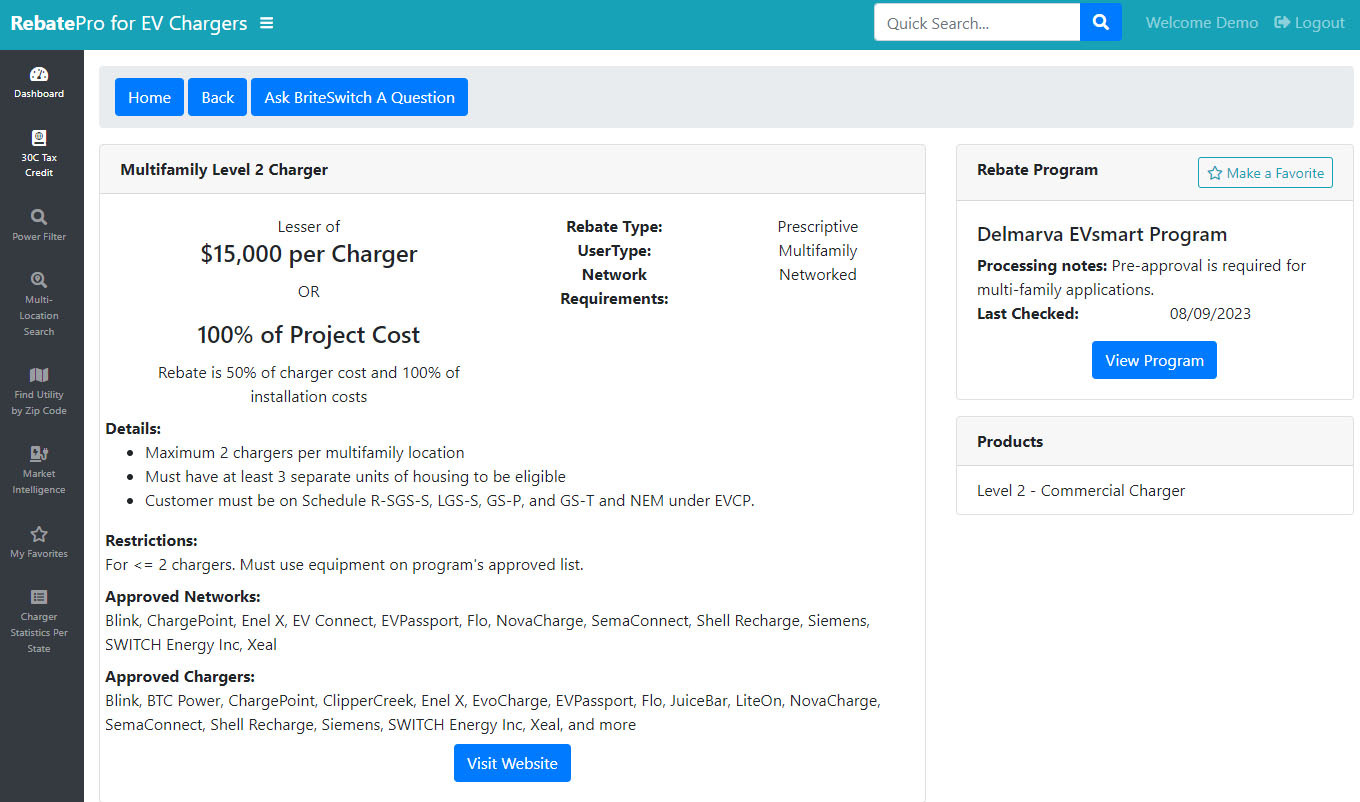
Rebate Finder is embedded directly on a website and uses different algorithms to simplify the information for the end user. It strips out technical jargon and makes it easy for an average user to understand what rebates might be available to them. The algorithm asks only the necessary information for each specific location to avoid overwhelming the user with too many questions.
Meaningful responses
These tools have been designed with the explicit purpose of giving users the most concise and accurate answer possible. It doesn't waste time generating a narrative or perfect paragraph of information; it just gives you the data you need when you need it. It not only saves you time but provides you with accurate and reliable information.
Consider Purpose-Built Software for Rebate Identification Instead of ChatGPT
Precision and efficiency are the cornerstones of successful rebate identification. While AI, like ChatGPT, has undeniably transformed various aspects of business operations, it is not be the optimal choice for identifying rebates. The risks associated with potential inaccuracies, outdated information, and cumbersome interactions outweigh the benefits. Rebates require a nuance that can't be achieved with a general-purpose search tool like Google. Instead, a specialized tool designed to tackle the unique challenges of rebate identification is much more effective.
Always remember, in the realm of rebate identification, the ability to make informed choices is your greatest asset. Choose wisely, and ensure your business continues to thrive.
Rebate Tools by BriteSwitch
Whether you're an electrical contractor looking to expand your services, a distributor seeking new revenue streams, or a manufacturer trying to increase sales of your product, understanding rebates can help you stay at the forefront of this exciting and rapidly growing industry. These tools can help you take advantage of incentives and rebates to increase your bottom line.
RebatePro
RebatePro is the industry-leading tool that allows you to find virtually every rebate, incentive, grant and tax credit across North America. So whether you're looking up rebates for a single location, analyzing a customer with thousands of facilities, or researching where you need to get your equipment on an approved rebate program list, the tool can help you fully maximize the use of these incentives to close more business.
Rebate Finder
Rebates and incentives are one of the best tools to help sell EV chargers to both consumers and businesses. Help customers find rebates for your specific products by integrating a Rebate Finder into your website. You can have this tool up and running on your website with minimal work. The data is constantly updated, so you don't need to worry about maintaining the information.






